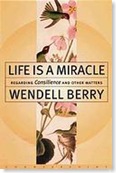Divided into Two Cultures
From LIfe is a Miracle: An essay against modern superstition by Wendell Berry:
 It is clearly bad for the sciences and the arts to be divided into "two cultures." It is bad for scientists to be working without a sense of obligation to cultural tradition. It is bad for artists and scholars in the humanities to be working without a sense of obligation to the world beyond the artifacts of culture. It is bad for both of these cultures to be operating strictly according to "professional standards," without local affection or community responsibility, much less any vision of an eternal order to which we all are subordinate and under obligation...
It is clearly bad for the sciences and the arts to be divided into "two cultures." It is bad for scientists to be working without a sense of obligation to cultural tradition. It is bad for artists and scholars in the humanities to be working without a sense of obligation to the world beyond the artifacts of culture. It is bad for both of these cultures to be operating strictly according to "professional standards," without local affection or community responsibility, much less any vision of an eternal order to which we all are subordinate and under obligation...
The badness of all this is manifested first in the loss even of the pretense of intellectual or academic community...Without...a vigorous conversation originating in the universities and emanating from them, we get what we've got: sciences that spread their effects upon the world as if the world were no more than an experimental laboratory; arts and "humanities" as unmindful of their influence as if the world did not exist; institutions of learning whose chief purpose is to acquire funds and be administered by administrators; governments whose chief purpose is to provide offices to members of political parties.
The ultimate manifestation of this incoherence is loss of trust — loss, moreover, of the entire cultural pattern by which we understand what it means to give and receive trust. The general assumption now is that everybody is working in his or her own interest and will continue to do so until checked by somebody whose self-interest is more powerful. That nobody trusts the politicians or their governments is probably the noisiest of present facts. More quietly, people are withdrawing their trust from the professions, the corporations, the education system, the religious institutions, the medical industry. Perhaps no expert has yet assigned a quantitative value to trust; it is nonetheless certain that when we have finished subtracting trust from all we think we have gained, not much will be left.
...There is no reason, as I hope and believe, that science and religion might not live together in amity and peace, so long as they both acknowledge their real differences and each remains within its own competence. Religion, that is, should not attempt to dispute what science has actually proved; and science should not claim to know what it does not know, it should not confuse theory and knowledge, and it should disavow any claim on what is empirically unknowable.





